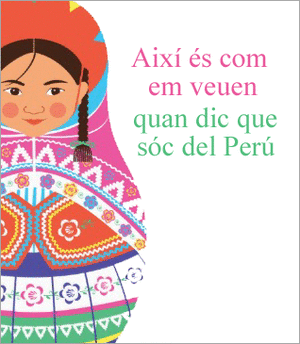
Us reproduim l'entrevista d'Europa News al professor de politologia Ramón Cotarelo:
'The Catalonia issue is about the end of Spain'
by European News - Sep 3, 2014
People need to realize the current debate is not about independence for Catalonia but about the possible end of Spain says political science professor Ramón Cotarelo.
With a possible vote on the issue of independence for Catalonia just weeks away, The Local spoke to self-confessed Spanish nationalist and political science professor Ramón Cotarelo about the possible dire consequences for Spain.
If the President of Catalonia Artur Mas sees his wishes fulfilled, people in the region will go to the polls on November 9th to take part in a vote on the issue of independence from the rest of Spain.
There are no guarantees the 'consultation' will go ahead. The Spanish parliament has ruled the unilateral vote illegal, while Prime Minister Mariano Rajoy has repeatedly said he will appeal to Spain's Constitutional Court if Mas pushes ahead with his plans.
Even figures within Catalonia's ruling party are starting to look for other options beyond the poll, according to an article published in Spain's centre-left daily El País recently.
But what will happen if the poll does go ahead? What role does the impending referendum in Scotland play? And how did this latest confrontation between Madrid and Catalonia arise?
To look at the answers to these questions The Local spoke recently to Ramón Cotarelo, Head of Political Sciences at Spain's distance learning university Uned.
- Let's start with the most dramatic possible outcome first. On October 6th 1934, the president of Catalonia Lluís Companys proclaimed an independent Catalan State. It lasted just ten hours before Spanish forces stormed the Catalan parliament quashing the rebellion. Could the same thing happen again?
No. Spain is not going to invade Catalonia, that won't happen, and no one considers it a serious possibility. However, there is no question that Madrid and Catalonia are facing a serious conflict. And the real issue here is that the central government does not have an answer for the situation at hand.
- Will the vote go ahead on November 9th even if Spain's Constitutional Court — as expected — vetoes the move?
The reality — and the thing that's important to remember — is that the pro-independence campaigners have nothing to lose. Whether it's the more hard-line factions like the (left-wing) ERC party, or the 'softer' (ruling, centrist) CiU party, the nationalists are in a much more comfortable position.
This is because they can can still decide to go ahead with poll even if the Constitutional Court vetoes it. And the reason for that is because they view the court as a tool of the central government anyway.
- How important is the outcome of the September 18th independence vote in Scotland? Will a 'no' vote in that poll lessen support for an independent Catalonia?
The Scotland vote is very important for a number of reasons. Many Catalans, for instance, look at the vote and say, "If they can vote, why can't we?"
However, the actual outcome of the Scottish referendum is less important. What is important about the vote for both Spain and Catalonia is that Scotland can celebrate it without any problems.
The Scotland referendum also strips any legitimacy from the position of Spain's central government. (Spanish prime minister) Rajoy has said several times that no democratic country can hold a referendum on territorial sovereignty. False. The Canadians have done it two times with Quebec and the British have done it once with Scotland.
The important thing about a referendum is that is is held.
One last point on this: although Catalonia is calling its vote a 'consultation', there is no question that the vote is actually a referendum on the future of Spain.
- Spain's socialist PSOE party support a so-called 'third way' on Catalonia, backing a federalist Spain where Catalonia has more powers. Is this possible, or is it — as some have said — too late?
In politics, everything is possible and it's never too late. The problem is that the PSOE have chosen the federal option as the "least bad" option.
The party also had twenty years in government and did nothing about Catalonia: the truth is they are not in favour of an independent Catalonia and they are not real federalists either. Their answer is a Band-Aid solution.
- Would the situation in Catalonia be different now if the PSOE were in power and not the (conservative) Popular Party?
I don't see a big difference between the Spanish nationalism of the left and that of the right, but there is quite a big difference in general attitude.
The nationalism of Spain's right is very much of the tradition of National Catholicism, which was the dominant ideology under (the dictator Francisco) Franco (and which saw the Catholic Church controlling many aspects of public life in Spain). And the PP's way of dealing with this problem has been to employ its traditional, brutal manner of acting.
We've seen that in comments by (Education Minister Ignacio) Wert's about "making Catalans more Spanish" and we've seen it in Rajoy's refusal to engage in proper dialogue with Catalonia.
On the other hand, in 2006 the PSOE failed to back a planned new regional statute for Catalonia, saying it went too far with its talk of Catalonia as a "nation", and that it gave too much power to the region. The end result was a watered-down document.
It's a terrible shame Spain didn't realize the importance of this statute at the time. (The 2006 statute continues to be a major sticking point between the central government and Catalonia).
Still, having said all that I don't believe the PSOE would act in as aggressive a manner toward Catalonia as the PP.
- What role has the idea of unequal financing of Spain's autonomous provinces played in the upsurge of Catalan nationalism?
Money has obviously played a key role in the debate, and if you look at the figures published by the Spanish government you'll see that the four communities which give pay the most to the state coffers are Madrid, Catalonia, the Balearics and Valencia.
That means three of the top four contributors are Catalan-speaking.
But language, culture and legal differences are also key to understanding Catalonia. Catalonia has a very deep history and the president of the Generalitat (as the region's parliament is known) is almost like a patriarchal figure for Catalans — something people in the rest of Spain don't understand.
You also have to remember that Lluís Companys is the only democratically elected European president to be executed (Franco ordered him to face a firing squad in 1940). So feelings run very deep.
- What role has Spain's economic crisis played in promoting Catalan nationalism?
The crisis has played a role of course: it has affected everything in Spanish life as most people will realize at the end of the month.
But the key problem in terms of Catalonia has been the lack of a democratic approach by the government. Make no mistake about it: they have acted in a 'Francoist' way, following on from Spain's authoritarian tradition.
The PP couldn't deal with (Basque separatist group) ETA. The previous PSOE government achieved progress there, so now the PP want their 'own medal' for finishing off Catalan independence.
- And how do you feel personally about the desire for an independence vote in Catalonia?
That's obviously a complicated question. Rationally, I feel that Catalans have a right to choose and that has to be respected. On the other hand, it would make me sad to see Catalonia leave.
But maybe an independent Catalonia is the only way to make Spaniards recognize the reality of their country: we have gone from being the rulers of a major empire to a bunch of slackers.
Spain is a disaster, and much of it is down to the incompetence of our ruling classes, something which stems partly from centuries of foreign rule.
- Take Gibraltar for example. What other great European nation would allow a foreign power to control a strategically significant of its territory?
What people need to realize is that the current debate is not about independence of Catalonia but about the possible end of Spain.
Ramón Cotarelo's latest book, tentatively titled El ser de España y la cuestión catalana, will be published by Planeta in October.









0 comentaris:
Publica un comentari a l'entrada